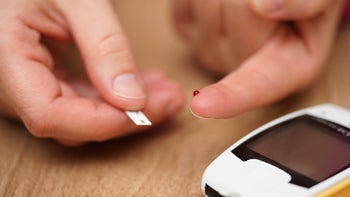
9 Dietary Supplements That Can Interact With Your Diabetes Medications
Key takeaways:
Common dietary supplements include vitamins, minerals, herbals and botanicals, and probiotics. While evidence is limited, some studies suggest certain dietary supplements interact with diabetes medications.
Supplements like niacin can raise your blood glucose (blood sugar), while ginseng and ginger can lower it. Check with a healthcare professional before starting a supplement. You might need to track your blood glucose more often if you add one to your routine.
Try to choose a supplement that has the USP-verified or NSF-certified mark on the label. This tells you the product’s purity and quality have been tested by an unbiased organization.
Table of contents

If you have diabetes, you’re probably careful about taking care of your body. Perhaps you study food labels before filling your cart at the grocery store. Or maybe you’ve set up reminders to help you take your diabetes medications on time. You might even be considering dietary supplements or a multivitamin to help boost your health.
In general, these are all smart steps to take. But before you add any supplements to your daily routine, it’s best to check in with a healthcare professional. Certain supplements and vitamins can interact with your diabetes medications and affect your blood glucose (blood sugar) levels. As a precaution, it’s important to keep drug-supplement interactions in mind if you’re living with diabetes.
How vitamins and supplements interact with diabetes medications
“Dietary supplement” is a broad term. It describes products that people add to their diet to improve their health. They’re primarily available over the counter. Common supplement types include vitamins, minerals, herbals and botanicals, and probiotics.
Cut the calories. Skip the interruptions.
youtheory® doctor-formulated GLP-1 Support allows you to focus on your weight loss journey– uninterrupted.

These statements have not been evaluated by the Food and Drug Administration. This product is not intended to diagnose, treat, cure, or prevent any disease.
Countless supplements are available, but some of them can interact with diabetes medications. Many can change the way your body metabolizes (breaks down) these medications. Others can affect the way your body responds to insulin.
And yet, there aren’t many studies that focus on the interactions between supplements and diabetes medications. In the research that’s out there, results are often mixed.
Here, we’ll break down the evidence behind nine possible interactions to be aware of.
1. Niacin
Niacin (vitamin B3) is found in many foods, such as beef, chicken, and marinara sauce. It’s available as both a prescription medication and supplement to help lower cholesterol. But niacin and diabetes may not be the best mix.
Some studies have found that high doses of niacin (1,500 mg per day or more) can raise your blood glucose. It may also slightly increase your risk for developing diabetes. Researchers believe this happens because niacin makes your body less sensitive to insulin. But this isn’t fully clear.
Don’t take niacin supplements without your healthcare professional’s knowledge. And be sure to let them know if you’re noticing symptoms of hyperglycemia (high blood glucose), such as headache, feeling thirsty, and urinating more often. They may also adjust your diabetes medication doses to account for niacin’s effects.
Keep in mind: Some multivitamins also contain niacin. This includes niacin in other forms, such as nicotinic acid and nicotinamide. The dose of niacin in a multivitamin is unlikely to lead to a noticeable change in your blood glucose levels.
2. St. John’s wort
St. John’s wort is an herbal product that’s marketed to help improve mood. Researchers are also looking into its use for other conditions, such as obsessive-compulsive disorder and premenstrual syndrome.
Dietary supplements for diabetes: Learn to separate fact from fiction when it comes to treating or preventing diabetes with supplements.
Become the expert: Understand the differences between common types of oral diabetes medications.
Which type of insulin is right for you? Read on for our guide to different types of insulin.
It’s notorious for interacting with medications. In most cases, it makes them leave your body too quickly, lowering medication effectiveness. But St. John’s wort can amplify the effects of some medications, too.
There haven't been many studies that look into how St. John’s wort affects diabetes medications. But it may make sulfonylureas like glipizide, thiazolidinediones like Actos (pioglitazone), and dipeptidyl peptidase-4 (DPP-4) inhibitors like Januvia (sitagliptin) less effective. This could lead to higher blood glucose levels.
Another study found that St. John’s wort can raise the level of metformin in your body. This can lower your blood glucose by raising the amount of insulin released by your body.
Talk to a healthcare professional before starting St. John’s wort. You might need to check your blood glucose more often, or they may tell you to avoid St. John’s wort altogether.
3. Ginseng
Ginseng is a plant that’s been used for thousands of years in medicine. People use it for various reasons, ranging from memory and immune system support to sexual health benefits.
Newer research also suggests that ginseng may lower fasting blood glucose and hemoglobin A1C in people with Type 2 diabetes. It’s thought that ginseng does this by telling your body to make more insulin and remove glucose from the blood.
If you start taking ginseng with diabetes medications, you may want to watch your blood glucose more closely. It’s possible for your blood glucose levels to drop too low. Look out for symptoms of hypoglycemia (low blood glucose), such as dizziness, a fast heartbeat, and hunger. Make sure to also keep a source of fast-acting sugar handy, like jelly beans or glucose tablets, in case your blood glucose drops too low.
Good to know: Many types of ginseng are available, the most popular ones being Asian and American ginseng. They might not all have the same effect on blood glucose. How ginseng is grown, processed, and extracted can affect how it lowers blood glucose.
4. Aloe vera
Aloe vera is a plant that’s well-known for relieving the symptoms of conditions like sunburn. But aloe vera also comes in oral forms, such as pills and juice. These are said to help with inflammation and gut problems.
Topical aloe vera isn’t a concern for diabetes interactions, but oral aloe vera may impact your blood glucose. Some studies found that it might lower fasting blood glucose in people with prediabetes. It may also lower A1C for people who already have diabetes.
Still, it’s a good idea to check your blood glucose more often if you’re taking oral aloe vera with your diabetes medications. Let your healthcare professional know if you’re experiencing more frequent episodes of low blood glucose.
5. Ginkgo biloba
Ginkgo biloba is a supplement that people take for many health conditions, including dementia, anxiety, and tinnitus (ringing in the ears).
One study found that ginkgo biloba can raise blood glucose levels in people who take oral diabetes medications. It’s not exactly clear why this happens, but researchers think it causes your liver to break down insulin faster. To be safe, keep an eye out for high blood glucose symptoms and monitor your blood glucose more frequently after starting ginkgo biloba.
On the other hand, some interactions may be positive. Another study looked at taking ginkgo biloba with metformin. It found that ginkgo biloba helped improve blood glucose for people who didn’t see much improvement from metformin alone. A healthcare professional can tell you if it’s a good idea to combine metformin with this supplement.
6. Ginger
Ginger is a versatile plant. It’s been used for thousands of years to flavor food, but people also use it to treat certain ailments, such as nausea and menstrual cramps.
It’s not fully clear if ginger interacts with diabetes medications, but some studies suggest that it can lower both your blood glucose and A1C. Other studies show it doesn’t affect fasting blood glucose, but it can lower your A1C.
If you add ginger to your routine, make sure to monitor your blood glucose more often. Watch out for symptoms of low blood glucose, such as dizziness, shakiness, and anxiety. Your healthcare professional might also want to check your A1C to see if they need to make any changes to your medication routine.
Tip: If you eat candied or pickled ginger, look for products that are sugar-free or low in salt. This may help prevent spikes in your blood glucose or blood pressure levels.
7. Vitamin E
Vitamin E is an essential vitamin that is found in a variety of foods, such as nuts, broccoli, and tomatoes. Vitamin E may help improve heart, eye, and brain health when eaten as part of a balanced diet.
When it comes to taking vitamin E as a supplement, more research on its safety is needed. High doses may increase your risk for certain problems, including stroke and prostate cancer. On the other hand, some studies say that vitamin E is helpful for people living with diabetes. It may help lower fasting blood glucose levels in the short term.
As mentioned before, blood glucose levels that are too low may be a problem for people taking diabetes medications. Combining diabetes medications with supplements that also lower blood glucose may be risky. You should monitor your blood glucose and speak with a healthcare professional about the risks and benefits of adding a vitamin E supplement to your routine.
8. Chromium
Chromium is a mineral that’s found naturally in many foods, such as fruit juice, certain meats, and lettuce. It may play a role in helping the body break down food for energy.
Chromium supplements may help improve your body’s response to insulin, but more research is needed. What’s more, it may also lower fasting blood glucose levels for people living with diabetes.
Again, lower-than-expected blood glucose levels are not ideal for people managing their diabetes with medication. Talk with a healthcare professional before starting a chromium supplement. If you get the OK, it’s a good idea to check your blood glucose levels more often to make sure they don’t get too low.
9. Green tea extract
Green tea has been a go-to beverage for thousands of years. But scientists are still working to uncover the details of its health benefits. It’s been reported to potentially support lower blood pressure, improved digestion, and kidney stone prevention. Studies suggest that green tea may also slightly lower the risk of diabetes.
As a supplement, green tea extract may improve inflammation and skin quality. What’s more, it may lower A1C and fasting blood glucose levels.
However, these welcome effects could come with risks. Combining diabetes medications with supplements that also lower blood glucose may increase the risk for hypoglycemia.
What medications are commonly used to treat diabetes?
While supplements may be able to lend a hand in your treatment, they shouldn’t take the place of diabetes medication. Many diabetes medications are FDA approved and recommended to lower blood glucose. Metformin is a common first-choice option, but other oral medications and injectables are also available. Top examples include:
Glucagon-like peptide-1 (GLP-1) agonists, like Ozempic (semaglutide)
Sodium-glucose cotransporter-2 (SGLT2) inhibitors, like Jardiance (empagliflozin)
Sulfonylureas, like glipizide
Thiazolidinediones, like Actos
DDP-4 inhibitors (or gliptins), like Januvia
Tips for choosing a dietary supplement
The FDA doesn't regulate supplements the same way they regulate medications. They don’t check the safety and effectiveness of supplements before they hit the market. This can make choosing a supplement stressful.
To protect yourself, choose supplement brands where the purity of their products has been verified by an independent organization. Look for the USP-verified or the NSF-certified marks on the labels.
While you’re looking at the label, also glance through the ingredient list. Some products, like gummy vitamins, contain sugar. When it comes to diabetes, sugar-free options are preferred.
The bottom line
Several dietary supplements have the potential to interact with diabetes medications. St. John's wort may interfere with how well your diabetes medications work. Niacin and ginkgo biloba can raise your blood glucose (blood sugar) levels. Other supplements, like ginseng and aloe vera might lower your blood glucose.
Before you start taking a dietary supplement, talk with a healthcare professional. They can tell you which interactions to avoid and how to manage your blood glucose if you are taking an interacting supplement.
Why trust our experts?



References
Alinejad-Mofrad, S., et al. (2015). Improvement of glucose and lipid profile status with Aloe vera in pre-diabetic subjects: A randomized controlled-trial. Journal of Diabetes and Metabolic Disorders.
Alkhalidi, F. (2023). A comparative study to assess the use of chromium in type 2 diabetes mellitus. Journal of Medicine and Life.
Anh, N. H., et al. (2020). Ginger on human health: A comprehensive systematic review of 109 randomized controlled trials. Nutrients.
Asbaghi, O., et al. (2023). Effect of vitamin E intake on glycemic control and insulin resistance in diabetic patients: An updated systematic review and meta-analysis of randomized controlled trials. Nutrition Journal.
Aziz, T. A., et al. (2018). The efficacy and safety of Ginkgo biloba extract as an adjuvant in type 2 diabetes mellitus patients ineffectively managed with metformin: A double-blind, randomized, placebo-controlled trial. Drug Design, Development and Therapy.
Chen, W., et al. (2019). Review of ginseng anti-diabetic studies. Molecules.
Daily, J. W., et al. (2015). Efficacy of ginger for treating Type 2 diabetes: A systematic review and meta-analysis of randomized clinical trials. Journal of Ethnic Foods.
DeKosky, S. T., et al. (2010). Ginkgo biloba for prevention of dementia: A randomized controlled trial. JAMA.
Goldberg, R. B., et al. (2008). Effects of niacin on glucose control in patients with dyslipidemia. Mayo Clinic Proceedings.
Goldie, C., et al. (2016). Niacin therapy and the risk of new-onset diabetes: A meta-analysis of randomised controlled trials. Heart.
Gupta, R. C., et al. (2017). Interactions between antidiabetic drugs and herbs: An overview of mechanisms of action and clinical implications. Diabetology and Metabolic Syndrome.
Huang, F. Y., et al. (2019). Dietary ginger as a traditional therapy for blood sugar control in patients with type 2 diabetes mellitus. Medicine.
Kudolo, G. B., et al. (2013). The effect of 3-month ingestion of Ginkgo biloba extract (EGb 761) on pancreatic β-cell function in response to glucose loading in individuals with non-insulin-dependent diabetes mellitus. The Journal of Clinical Pharmacology.
Liu, K., et al. (2013). Effect of green tea on glucose control and insulin sensitivity: A meta-analysis of 17 randomized controlled trials. The American Journal of Clinical Nutrition.
May, M., et al. (2016). Clinically and pharmacologically relevant interactions of antidiabetic drugs. Therapeutic Advances in Endocrinology and Metabolism.
National Center for Complementary and Integrative Health. (2018). Using dietary supplements wisely.
National Center for Complementary and Integrative Health. (2020). Aloe vera.
National Center for Complementary and Integrative Health. (2020). Asian ginseng.
National Center for Complementary and Integrative Health. (2020). Ginkgo.
National Center for Complementary and Integrative Health. (2020). Green tea.
National Center for Complementary and Integrative Health. (2020). St. John’s wort.
National Institutes of Health. (2021). Vitamin E.
National Institutes of Health. (2022). Chromium.
National Institutes of Health. (2022). Niacin.
Peterson, B., et al. (2023). St. John’s wort. StatPearls.
Suksomboon, N., et al. (2016). Effect of Aloe vera on glycaemic control in prediabetes and type 2 diabetes: A systematic review and meta-analysis. Journal of Clinical Pharmacy and Therapeutics.
U.S. Food and Drug Administration. (2022). FDA 101: Dietary supplements.
Zhou, S., et al. (2004). Pharmacokinetic interactions of drugs with St John's wort. Journal of Psychopharmacology.

























